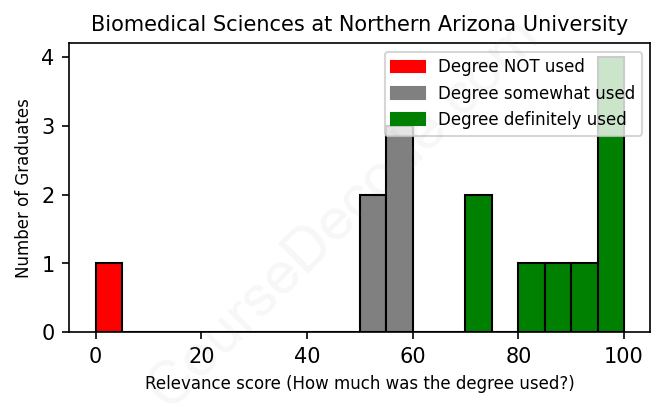
First, some facts. Of the Biomedical Sciences graduates from Northern Arizona University we've analyzed , here's how many have used (or NOT used) their degree in their career:

These are estimates based on AI analysis of 15 LinkedIn profiles (see below).
The verdict? Slightly above average. Overall, with an average relevance score of 71%, Biomedical Sciences graduates from Northern Arizona University have a slightly higher likelihood (+4%) of finding work in this field compared to the average graduate across all fields:
And for comparison, here's the chart for all profiles we've looked at across all degrees.
Also, after graduating, 53% of these graduates have pursued further education other than another Bachelor's degree (such as a Masters degree or other), compared to the average across all profiles of 35%. This suggests you may need more than just a Bachelors degree to be competitive as a Biomedical Sciences graduate.
See the details:
|
Relevance score: 95% We think this person has gone into a career highly relevant to their degree. We think this person has gone into a career highly relevant to their degree.
DEGREE INFOGraduated in 2013 from Northern Arizona University with a Bachelor's Degree in Biomedical Sciences. No other secondary education since. JOB HISTORY SINCE GRADUATIONCaregiver The Springs Living Oct 2013 - Mar 2014 Clinical Research Specialist  Novum Pharmaceutical Research Services Jul 2014 - Jan 2015 Recruitment Coordinator  HOPE Research Institute Jul 2015 - Jun 2017 Research Assistant  HOPE Research Institute Jun 2017 - Feb 2019 Clinical Research Coordinator  HOPE Research Institute Feb 2019 - Feb 2021 Clinical Research Coordinator  Mayo Clinic Jul 2021 - Aug 2022 Senior Program Coordinator  Mayo Clinic Aug 2022 - Jun 2023 Research Protocol Specialist  Mayo Clinic Jun 2023 - Present ABOUT-10 years of experience working in clinical research. -Working knowledge of GCP and ICH guidelines-Experience in the coordination of patient participation in clinical research protocols This includes but is not limited to ensuring assigned studies are conducted in accordance with the Food and Drug Administration (FDA), Office for Human Research Protections (OHRP), Good Clinical Practices (GCP), and institutional guidelines. -Extensive experience in the recruitment of study participants into clinical research protocols and the creation of recruitment materials (print media, social media campaigns, radio/tv) and supplements in accordance with regulatory guidelines. |
The top 10 most common jobs done by the graduates we've analyzed (ranked most common to least) are:
When you look at the jobs people with a Biomedical Sciences degree from Northern Arizona University have landed, there are a mix of roles that vary significantly in their relevance to the field. Many graduates have taken positions directly related to healthcare and scientific research, like Forensic Certifying Scientists, Veterinary Technicians, and Clinical Research Coordinators, which clearly lean on their biomedical background. These roles tend to make extensive use of the knowledge and skills acquired during their degree, such as understanding biological evidence, animal health, and clinical protocols. It's evident that a solid chunk of graduates found their way into jobs that are pretty closely linked with the core principles of biomedical sciences.
However, it's also interesting (and maybe a little surprising) to see that not all positions are directly relevant. Many graduates have ended up in roles that don’t utilize their education as much, such as office management, teaching, or even something as unrelated as working at Starbucks. While these positions might benefit from some soft skills learned in their studies, like communication and critical thinking, they don’t call for any deep biomedical knowledge. So, the distribution isn’t perfectly skewed towards biomedical-relevant careers, but there’s definitely a notable number of grads who are doing meaningful work in the health and science sectors! Overall, it seems like a decent proportion of these graduates have found jobs where they can apply what they've learned, but there's also a fair share in unrelated fields, which is pretty common in any degree pathway.
Here is a visual representation of the most common words in job titles for Biomedical Sciences graduates (this is across all Biomedical Sciences graduates we've analyzed, not just those who went to Northern Arizona University):

From analyzing the careers of graduates with a degree in Biomedical Sciences from Northern Arizona University, it seems like many of them have found their way into relevant fields right after graduation. For example, early positions often include roles as veterinary technicians, clinical research coordinators, and medical scribes, which align well with the scientific focus of their studies. These first jobs appear to set a solid foundation for further career advancements as many graduates have transitioned into roles that require more responsibility and expertise, such as clinical research specialists and laboratory managers.
Fast forward five to ten years, and many graduates have moved up the ladder in medical and scientific fields. Graduates now work as certified nursing assistants, microbiology lab technicians, and even veterinarians, showcasing a trajectory that leads them toward specialized roles within healthcare and research. While some have ventured into unrelated areas or more atypical jobs like teaching or working in the automotive industry, a significant portion stayed true to their Biomedical Sciences roots and achieved roles that emphasize their scientific training. Overall, it looks like a good number of graduates from this program have managed to secure solid careers that are either within or closely associated with Biomedical Sciences, which is pretty encouraging for anyone considering this path!
Honestly, a Bachelor’s degree in Biomedical Sciences can be pretty challenging, but it really depends on your interests and study habits. At Northern Arizona University, you’ll encounter a mix of intense science courses like biology, chemistry, and anatomy, which can be tough if you're not into those subjects. The workload can be heavy at times, especially with labs and group projects, but if you’re passionate about the subject and willing to put in the effort, it’s totally manageable. It’s about finding a balance and using the resources available, like study groups and professors, to help you out. Compared to some other degrees, it might feel a bit on the tougher side, but many students get through it and find it rewarding overall!
Most commonly, in the LinkedIn profiles we've looked at, it takes people 4 years to finish a Bachelor degree in Biomedical Sciences.
Looking at the career paths of these Biomedical Sciences graduates from Northern Arizona University, it seems like some of them have found decent positions, but overall, there's a mix of pay scales here. The graduates who climbed the ladder at Cordant Health Solutions and Mayo Clinic likely have good earning potential, especially in management or specialized roles. However, some other roles, like those in veterinary tech or as EMTs, tend to pay less, especially early on in their careers. For instance, the recent graduates taking on internships and lower-level positions might not be raking in the big bucks just yet, but they’re probably gaining valuable experience. So, it's a bit of a mixed bag - some look like they're doing well, while others might still be on that journey to making decent money.
Here is a visual representation of the most common words seen in the "about" section of LinkedIn profiles who have a Bachelor degree in Biomedical Sciences (this is across all Biomedical Sciences graduates we've analyzed, not just those who went to Northern Arizona University). This may or may not be useful:

Here are all colleges offering a Bachelor degree in Biomedical Sciences (ordered by the average relevance score of their Biomedical Sciences graduates, best to worst) where we have analyzed at least 10 of their graduates:
| College | Score | Count |
|---|---|---|
 Western Michigan University Western Michigan University
|
81 | 17 |
 Marquette University Marquette University
|
78 | 29 |
 University of Michigan University of Michigan
|
77 | 10 |
 Colorado State University Colorado State University
|
77 | 19 |
 University at Buffalo University at Buffalo
|
75 | 18 |
 California Polytechnic State University-San Luis Obispo California Polytechnic State University-San Luis Obispo
|
74 | 13 |
 University of Connecticut University of Connecticut
|
74 | 15 |
 Texas A&M University Texas A&M University
|
73 | 59 |
 Auburn University Auburn University
|
71 | 26 |
 Northern Arizona University Northern Arizona University
|
71 | 15 |
 Rensselaer Polytechnic Institute Rensselaer Polytechnic Institute
|
70 | 10 |
 University of Central Florida University of Central Florida
|
69 | 26 |
 University of South Florida University of South Florida
|
68 | 48 |
 Georgia Institute of Technology Georgia Institute of Technology
|
67 | 41 |
 The Ohio State University The Ohio State University
|
64 | 14 |
 Rochester Institute of Technology Rochester Institute of Technology
|
64 | 12 |
 Case Western Reserve University Case Western Reserve University
|
63 | 12 |
 Grand Valley State University Grand Valley State University
|
59 | 35 |
 Arizona State University Arizona State University
|
58 | 12 |